Review of Decision Support Systems and its Applications in Business
VerifiedAdded on 2022/08/09
|11
|1866
|33
Report
AI Summary
This report provides a comprehensive review of Decision Support Systems (DSS) with a specific focus on their application within the manufacturing sector. The review begins with a summary of an article by Felsberger, Oberegger, and Reiner, which explores the role of DSS in manufacturing systems, highlighting how they facilitate data-driven decision-making and improve operational efficiency. The report then presents a Critically Appraised Topic (CAT) analysis, investigating the impact of DSS on employee productivity in manufacturing. The CAT analysis includes a detailed methodology encompassing the research question, PICOC framework, inclusion criteria, search strategy, study selection, and critical appraisal. The findings indicate that DSS significantly aids in resolving issues within manufacturing, such as predicting material needs and understanding customer preferences. The report concludes by discussing the limitations of the analysis, implications for business, and recommendations for future research, emphasizing the potential benefits of DSS in enhancing decision-making and reducing operational costs. The implications of DSS in the manufacturing sector are that there are three main aspects for which the DSS is beneficial in the manufacturing sector are: Degree of the choices provided by the system to the user Presence of the competition among the concurrent users Utilisation of proper training for increasing the familiarity of the system.

Running head: REVIEW OF DECISION SUPPORT SYSTEMS
REVIEW OF DECISION SUPPORT SYSTEMS
Name of student
Name of university
Author’s note:
REVIEW OF DECISION SUPPORT SYSTEMS
Name of student
Name of university
Author’s note:
Paraphrase This Document
Need a fresh take? Get an instant paraphrase of this document with our AI Paraphraser
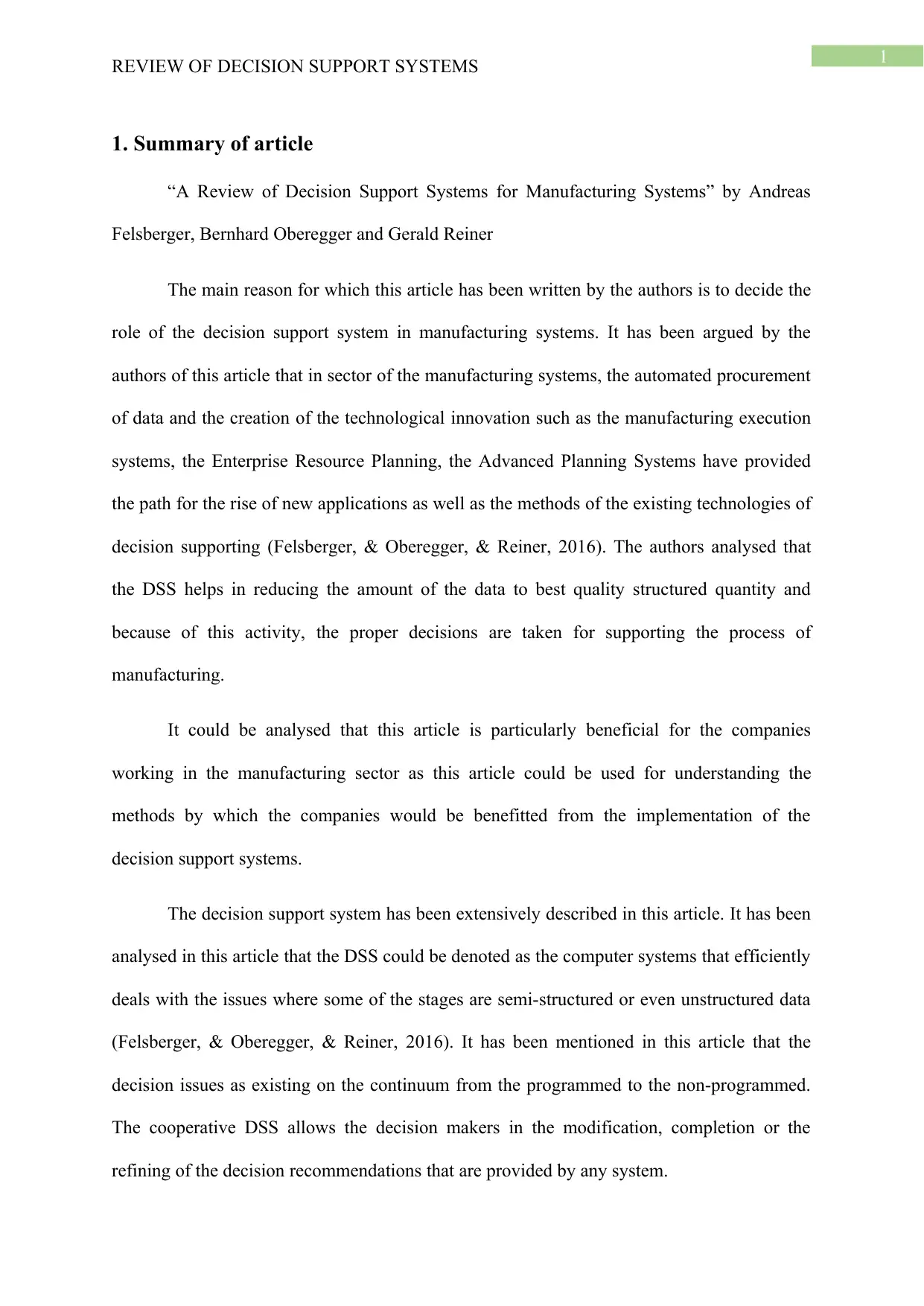
1
REVIEW OF DECISION SUPPORT SYSTEMS
1. Summary of article
“A Review of Decision Support Systems for Manufacturing Systems” by Andreas
Felsberger, Bernhard Oberegger and Gerald Reiner
The main reason for which this article has been written by the authors is to decide the
role of the decision support system in manufacturing systems. It has been argued by the
authors of this article that in sector of the manufacturing systems, the automated procurement
of data and the creation of the technological innovation such as the manufacturing execution
systems, the Enterprise Resource Planning, the Advanced Planning Systems have provided
the path for the rise of new applications as well as the methods of the existing technologies of
decision supporting (Felsberger, & Oberegger, & Reiner, 2016). The authors analysed that
the DSS helps in reducing the amount of the data to best quality structured quantity and
because of this activity, the proper decisions are taken for supporting the process of
manufacturing.
It could be analysed that this article is particularly beneficial for the companies
working in the manufacturing sector as this article could be used for understanding the
methods by which the companies would be benefitted from the implementation of the
decision support systems.
The decision support system has been extensively described in this article. It has been
analysed in this article that the DSS could be denoted as the computer systems that efficiently
deals with the issues where some of the stages are semi-structured or even unstructured data
(Felsberger, & Oberegger, & Reiner, 2016). It has been mentioned in this article that the
decision issues as existing on the continuum from the programmed to the non-programmed.
The cooperative DSS allows the decision makers in the modification, completion or the
refining of the decision recommendations that are provided by any system.
REVIEW OF DECISION SUPPORT SYSTEMS
1. Summary of article
“A Review of Decision Support Systems for Manufacturing Systems” by Andreas
Felsberger, Bernhard Oberegger and Gerald Reiner
The main reason for which this article has been written by the authors is to decide the
role of the decision support system in manufacturing systems. It has been argued by the
authors of this article that in sector of the manufacturing systems, the automated procurement
of data and the creation of the technological innovation such as the manufacturing execution
systems, the Enterprise Resource Planning, the Advanced Planning Systems have provided
the path for the rise of new applications as well as the methods of the existing technologies of
decision supporting (Felsberger, & Oberegger, & Reiner, 2016). The authors analysed that
the DSS helps in reducing the amount of the data to best quality structured quantity and
because of this activity, the proper decisions are taken for supporting the process of
manufacturing.
It could be analysed that this article is particularly beneficial for the companies
working in the manufacturing sector as this article could be used for understanding the
methods by which the companies would be benefitted from the implementation of the
decision support systems.
The decision support system has been extensively described in this article. It has been
analysed in this article that the DSS could be denoted as the computer systems that efficiently
deals with the issues where some of the stages are semi-structured or even unstructured data
(Felsberger, & Oberegger, & Reiner, 2016). It has been mentioned in this article that the
decision issues as existing on the continuum from the programmed to the non-programmed.
The cooperative DSS allows the decision makers in the modification, completion or the
refining of the decision recommendations that are provided by any system.
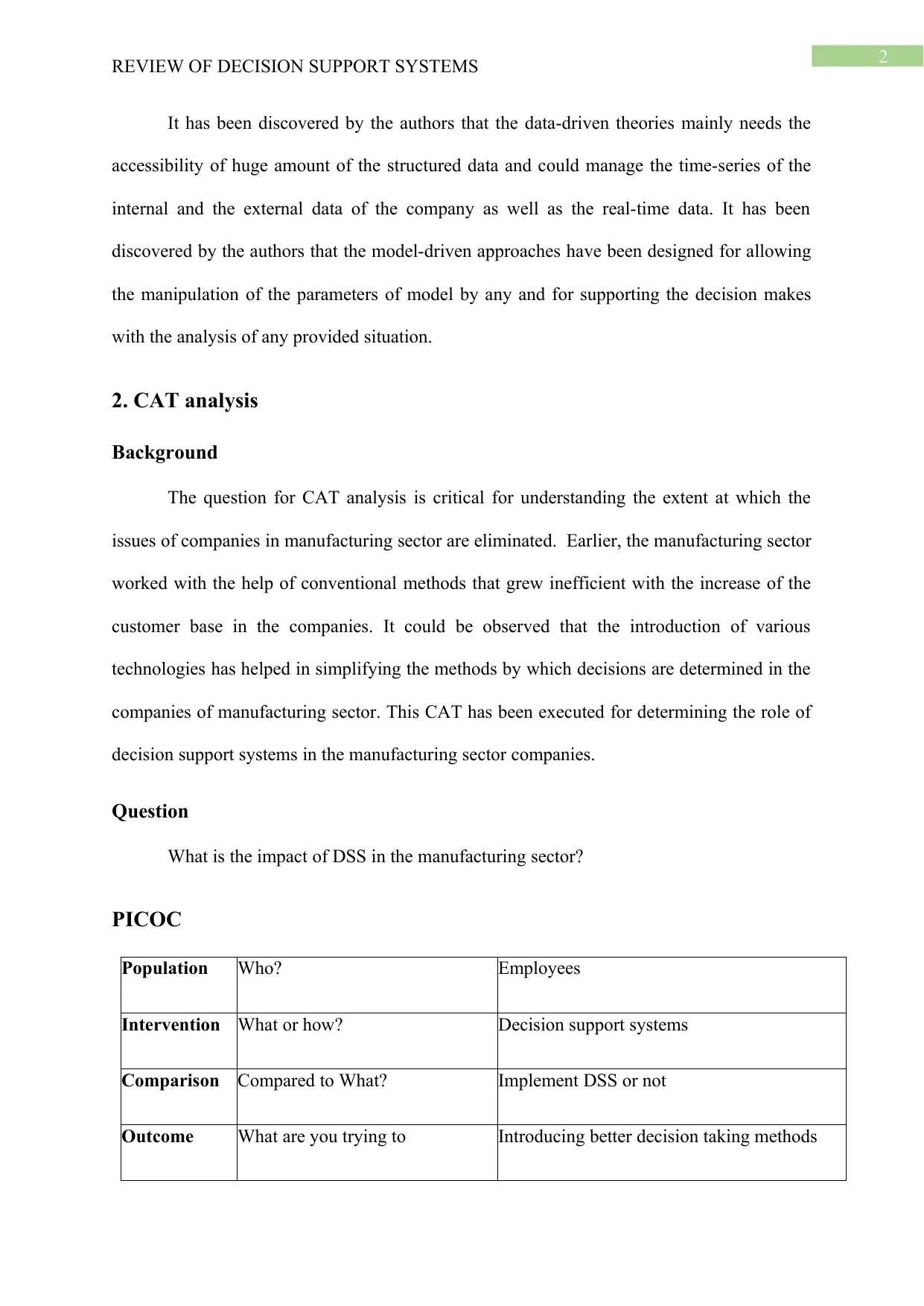
2
REVIEW OF DECISION SUPPORT SYSTEMS
It has been discovered by the authors that the data-driven theories mainly needs the
accessibility of huge amount of the structured data and could manage the time-series of the
internal and the external data of the company as well as the real-time data. It has been
discovered by the authors that the model-driven approaches have been designed for allowing
the manipulation of the parameters of model by any and for supporting the decision makes
with the analysis of any provided situation.
2. CAT analysis
Background
The question for CAT analysis is critical for understanding the extent at which the
issues of companies in manufacturing sector are eliminated. Earlier, the manufacturing sector
worked with the help of conventional methods that grew inefficient with the increase of the
customer base in the companies. It could be observed that the introduction of various
technologies has helped in simplifying the methods by which decisions are determined in the
companies of manufacturing sector. This CAT has been executed for determining the role of
decision support systems in the manufacturing sector companies.
Question
What is the impact of DSS in the manufacturing sector?
PICOC
Population Who? Employees
Intervention What or how? Decision support systems
Comparison Compared to What? Implement DSS or not
Outcome What are you trying to Introducing better decision taking methods
REVIEW OF DECISION SUPPORT SYSTEMS
It has been discovered by the authors that the data-driven theories mainly needs the
accessibility of huge amount of the structured data and could manage the time-series of the
internal and the external data of the company as well as the real-time data. It has been
discovered by the authors that the model-driven approaches have been designed for allowing
the manipulation of the parameters of model by any and for supporting the decision makes
with the analysis of any provided situation.
2. CAT analysis
Background
The question for CAT analysis is critical for understanding the extent at which the
issues of companies in manufacturing sector are eliminated. Earlier, the manufacturing sector
worked with the help of conventional methods that grew inefficient with the increase of the
customer base in the companies. It could be observed that the introduction of various
technologies has helped in simplifying the methods by which decisions are determined in the
companies of manufacturing sector. This CAT has been executed for determining the role of
decision support systems in the manufacturing sector companies.
Question
What is the impact of DSS in the manufacturing sector?
PICOC
Population Who? Employees
Intervention What or how? Decision support systems
Comparison Compared to What? Implement DSS or not
Outcome What are you trying to Introducing better decision taking methods
⊘ This is a preview!⊘
Do you want full access?
Subscribe today to unlock all pages.

Trusted by 1+ million students worldwide
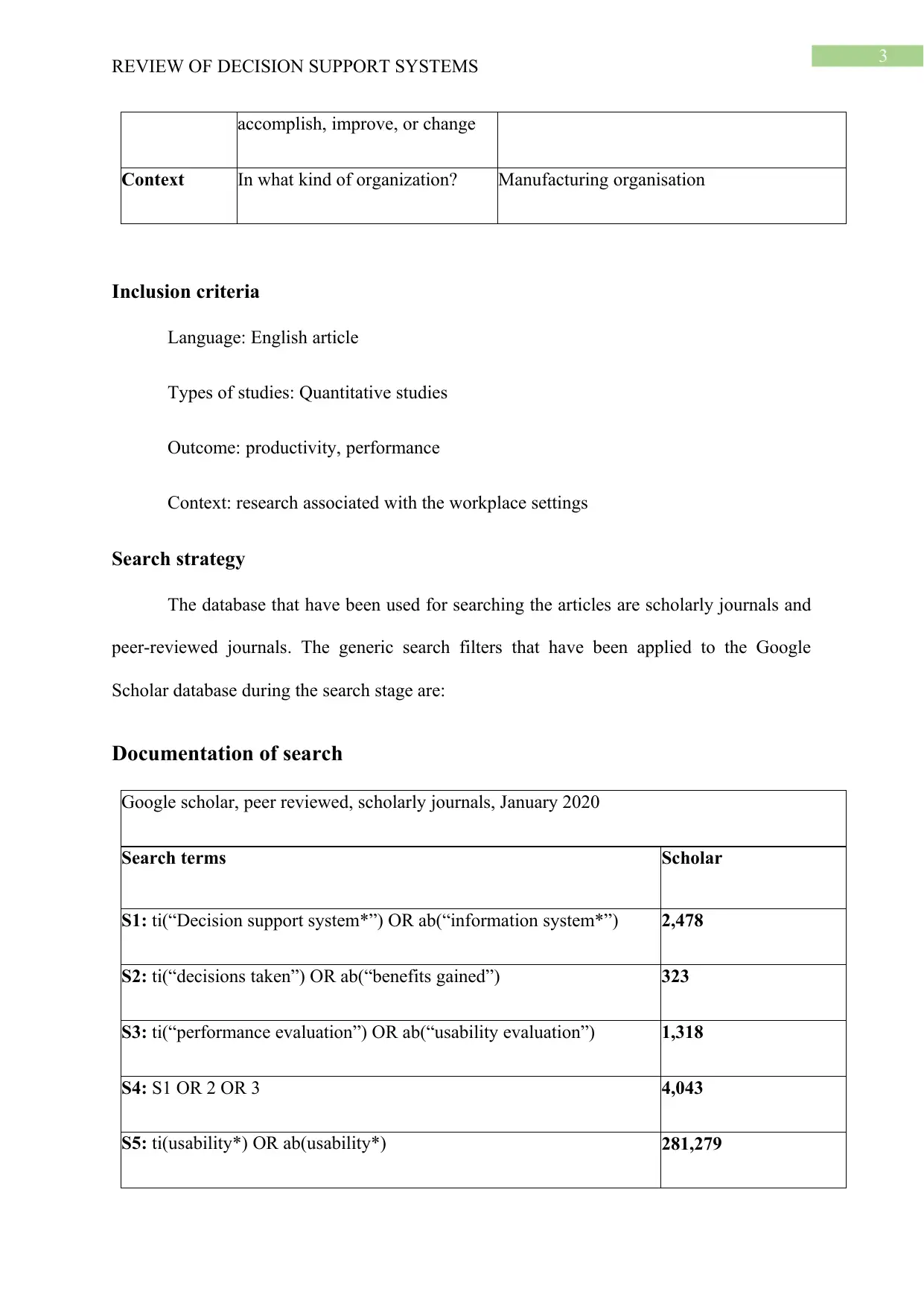
3
REVIEW OF DECISION SUPPORT SYSTEMS
accomplish, improve, or change
Context In what kind of organization? Manufacturing organisation
Inclusion criteria
Language: English article
Types of studies: Quantitative studies
Outcome: productivity, performance
Context: research associated with the workplace settings
Search strategy
The database that have been used for searching the articles are scholarly journals and
peer-reviewed journals. The generic search filters that have been applied to the Google
Scholar database during the search stage are:
Documentation of search
Google scholar, peer reviewed, scholarly journals, January 2020
Search terms Scholar
S1: ti(“Decision support system*”) OR ab(“information system*”) 2,478
S2: ti(“decisions taken”) OR ab(“benefits gained”) 323
S3: ti(“performance evaluation”) OR ab(“usability evaluation”) 1,318
S4: S1 OR 2 OR 3 4,043
S5: ti(usability*) OR ab(usability*) 281,279
REVIEW OF DECISION SUPPORT SYSTEMS
accomplish, improve, or change
Context In what kind of organization? Manufacturing organisation
Inclusion criteria
Language: English article
Types of studies: Quantitative studies
Outcome: productivity, performance
Context: research associated with the workplace settings
Search strategy
The database that have been used for searching the articles are scholarly journals and
peer-reviewed journals. The generic search filters that have been applied to the Google
Scholar database during the search stage are:
Documentation of search
Google scholar, peer reviewed, scholarly journals, January 2020
Search terms Scholar
S1: ti(“Decision support system*”) OR ab(“information system*”) 2,478
S2: ti(“decisions taken”) OR ab(“benefits gained”) 323
S3: ti(“performance evaluation”) OR ab(“usability evaluation”) 1,318
S4: S1 OR 2 OR 3 4,043
S5: ti(usability*) OR ab(usability*) 281,279
Paraphrase This Document
Need a fresh take? Get an instant paraphrase of this document with our AI Paraphraser
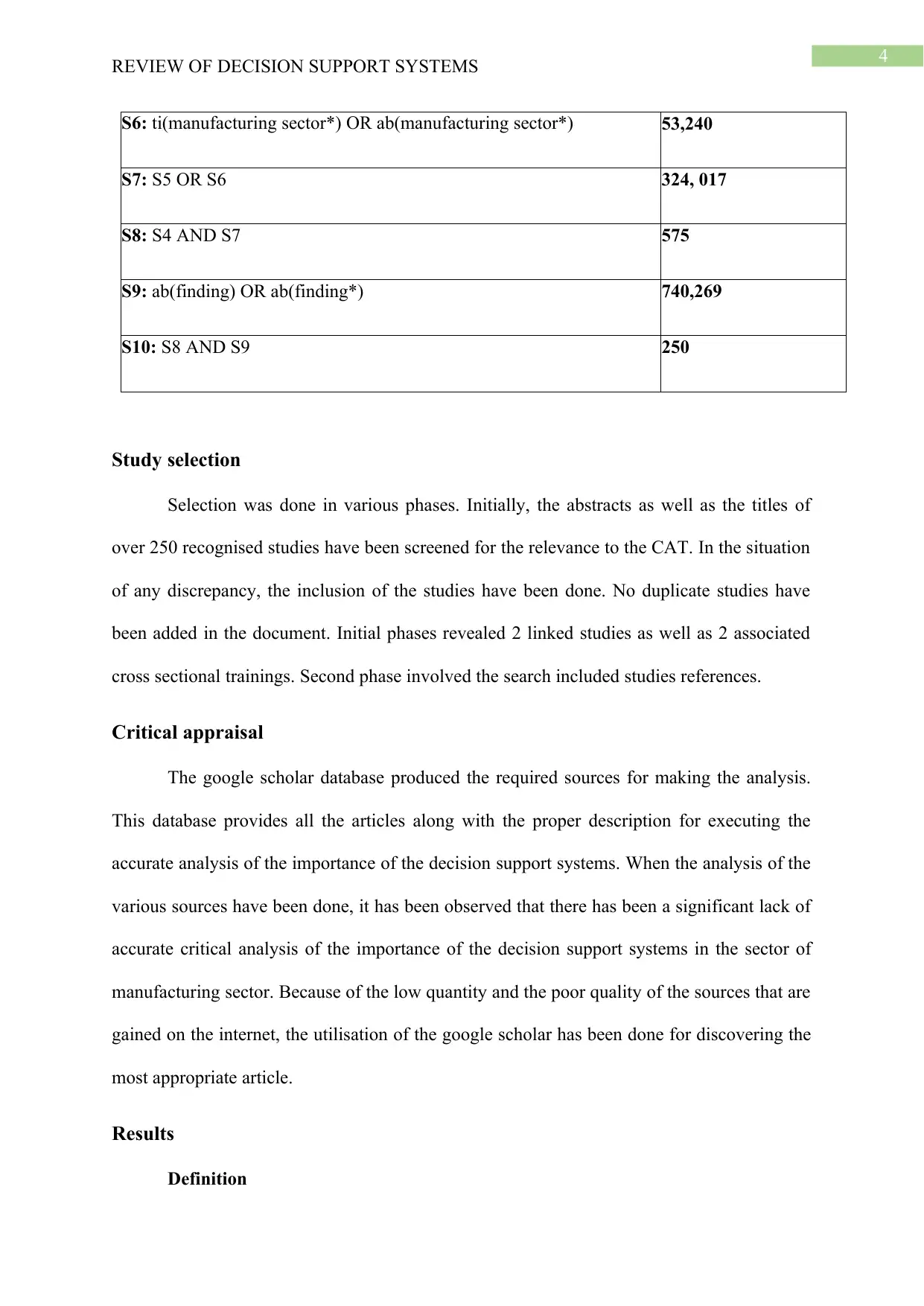
4
REVIEW OF DECISION SUPPORT SYSTEMS
S6: ti(manufacturing sector*) OR ab(manufacturing sector*) 53,240
S7: S5 OR S6 324, 017
S8: S4 AND S7 575
S9: ab(finding) OR ab(finding*) 740,269
S10: S8 AND S9 250
Study selection
Selection was done in various phases. Initially, the abstracts as well as the titles of
over 250 recognised studies have been screened for the relevance to the CAT. In the situation
of any discrepancy, the inclusion of the studies have been done. No duplicate studies have
been added in the document. Initial phases revealed 2 linked studies as well as 2 associated
cross sectional trainings. Second phase involved the search included studies references.
Critical appraisal
The google scholar database produced the required sources for making the analysis.
This database provides all the articles along with the proper description for executing the
accurate analysis of the importance of the decision support systems. When the analysis of the
various sources have been done, it has been observed that there has been a significant lack of
accurate critical analysis of the importance of the decision support systems in the sector of
manufacturing sector. Because of the low quantity and the poor quality of the sources that are
gained on the internet, the utilisation of the google scholar has been done for discovering the
most appropriate article.
Results
Definition
REVIEW OF DECISION SUPPORT SYSTEMS
S6: ti(manufacturing sector*) OR ab(manufacturing sector*) 53,240
S7: S5 OR S6 324, 017
S8: S4 AND S7 575
S9: ab(finding) OR ab(finding*) 740,269
S10: S8 AND S9 250
Study selection
Selection was done in various phases. Initially, the abstracts as well as the titles of
over 250 recognised studies have been screened for the relevance to the CAT. In the situation
of any discrepancy, the inclusion of the studies have been done. No duplicate studies have
been added in the document. Initial phases revealed 2 linked studies as well as 2 associated
cross sectional trainings. Second phase involved the search included studies references.
Critical appraisal
The google scholar database produced the required sources for making the analysis.
This database provides all the articles along with the proper description for executing the
accurate analysis of the importance of the decision support systems. When the analysis of the
various sources have been done, it has been observed that there has been a significant lack of
accurate critical analysis of the importance of the decision support systems in the sector of
manufacturing sector. Because of the low quantity and the poor quality of the sources that are
gained on the internet, the utilisation of the google scholar has been done for discovering the
most appropriate article.
Results
Definition
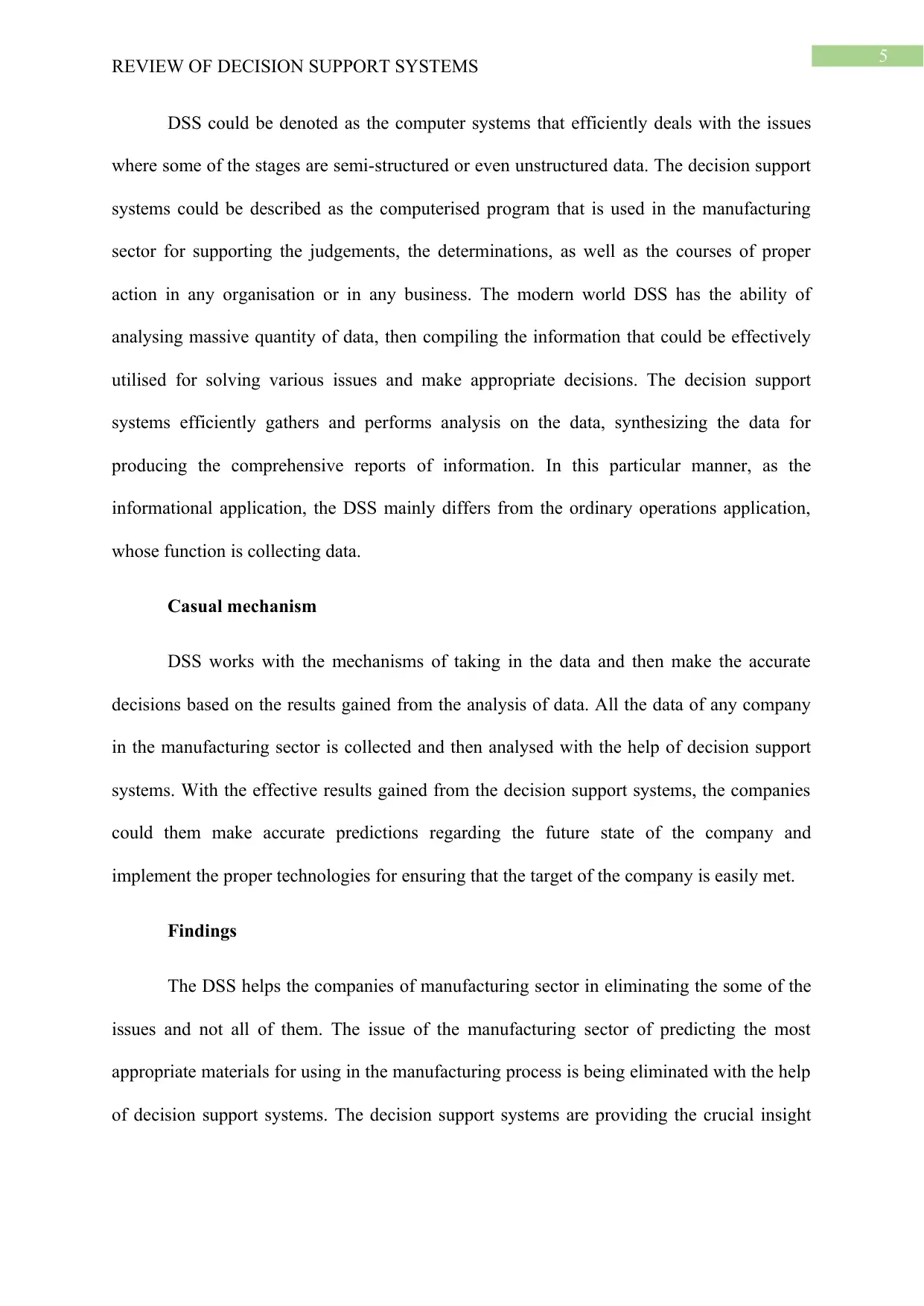
5
REVIEW OF DECISION SUPPORT SYSTEMS
DSS could be denoted as the computer systems that efficiently deals with the issues
where some of the stages are semi-structured or even unstructured data. The decision support
systems could be described as the computerised program that is used in the manufacturing
sector for supporting the judgements, the determinations, as well as the courses of proper
action in any organisation or in any business. The modern world DSS has the ability of
analysing massive quantity of data, then compiling the information that could be effectively
utilised for solving various issues and make appropriate decisions. The decision support
systems efficiently gathers and performs analysis on the data, synthesizing the data for
producing the comprehensive reports of information. In this particular manner, as the
informational application, the DSS mainly differs from the ordinary operations application,
whose function is collecting data.
Casual mechanism
DSS works with the mechanisms of taking in the data and then make the accurate
decisions based on the results gained from the analysis of data. All the data of any company
in the manufacturing sector is collected and then analysed with the help of decision support
systems. With the effective results gained from the decision support systems, the companies
could them make accurate predictions regarding the future state of the company and
implement the proper technologies for ensuring that the target of the company is easily met.
Findings
The DSS helps the companies of manufacturing sector in eliminating the some of the
issues and not all of them. The issue of the manufacturing sector of predicting the most
appropriate materials for using in the manufacturing process is being eliminated with the help
of decision support systems. The decision support systems are providing the crucial insight
REVIEW OF DECISION SUPPORT SYSTEMS
DSS could be denoted as the computer systems that efficiently deals with the issues
where some of the stages are semi-structured or even unstructured data. The decision support
systems could be described as the computerised program that is used in the manufacturing
sector for supporting the judgements, the determinations, as well as the courses of proper
action in any organisation or in any business. The modern world DSS has the ability of
analysing massive quantity of data, then compiling the information that could be effectively
utilised for solving various issues and make appropriate decisions. The decision support
systems efficiently gathers and performs analysis on the data, synthesizing the data for
producing the comprehensive reports of information. In this particular manner, as the
informational application, the DSS mainly differs from the ordinary operations application,
whose function is collecting data.
Casual mechanism
DSS works with the mechanisms of taking in the data and then make the accurate
decisions based on the results gained from the analysis of data. All the data of any company
in the manufacturing sector is collected and then analysed with the help of decision support
systems. With the effective results gained from the decision support systems, the companies
could them make accurate predictions regarding the future state of the company and
implement the proper technologies for ensuring that the target of the company is easily met.
Findings
The DSS helps the companies of manufacturing sector in eliminating the some of the
issues and not all of them. The issue of the manufacturing sector of predicting the most
appropriate materials for using in the manufacturing process is being eliminated with the help
of decision support systems. The decision support systems are providing the crucial insight
⊘ This is a preview!⊘
Do you want full access?
Subscribe today to unlock all pages.

Trusted by 1+ million students worldwide
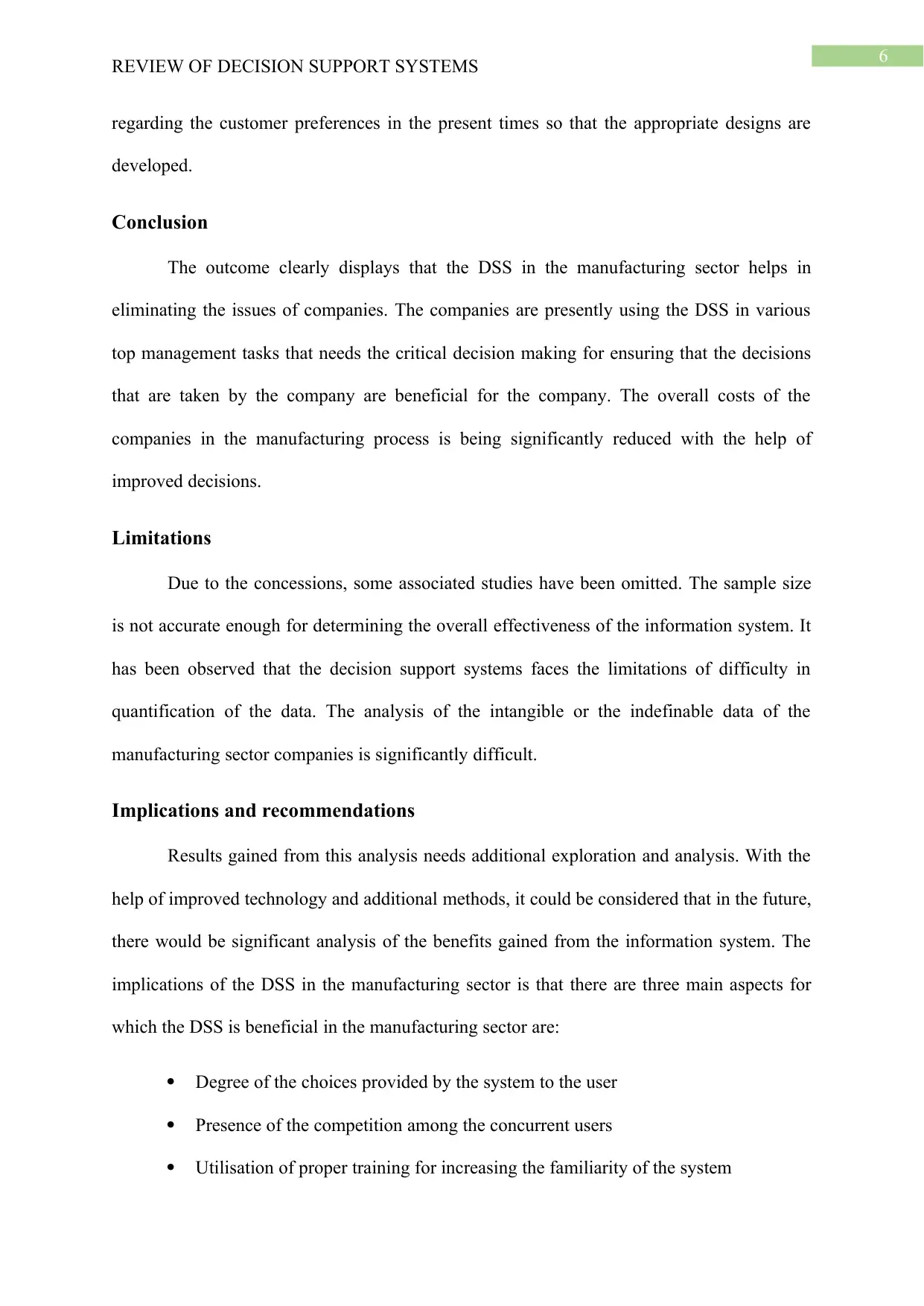
6
REVIEW OF DECISION SUPPORT SYSTEMS
regarding the customer preferences in the present times so that the appropriate designs are
developed.
Conclusion
The outcome clearly displays that the DSS in the manufacturing sector helps in
eliminating the issues of companies. The companies are presently using the DSS in various
top management tasks that needs the critical decision making for ensuring that the decisions
that are taken by the company are beneficial for the company. The overall costs of the
companies in the manufacturing process is being significantly reduced with the help of
improved decisions.
Limitations
Due to the concessions, some associated studies have been omitted. The sample size
is not accurate enough for determining the overall effectiveness of the information system. It
has been observed that the decision support systems faces the limitations of difficulty in
quantification of the data. The analysis of the intangible or the indefinable data of the
manufacturing sector companies is significantly difficult.
Implications and recommendations
Results gained from this analysis needs additional exploration and analysis. With the
help of improved technology and additional methods, it could be considered that in the future,
there would be significant analysis of the benefits gained from the information system. The
implications of the DSS in the manufacturing sector is that there are three main aspects for
which the DSS is beneficial in the manufacturing sector are:
Degree of the choices provided by the system to the user
Presence of the competition among the concurrent users
Utilisation of proper training for increasing the familiarity of the system
REVIEW OF DECISION SUPPORT SYSTEMS
regarding the customer preferences in the present times so that the appropriate designs are
developed.
Conclusion
The outcome clearly displays that the DSS in the manufacturing sector helps in
eliminating the issues of companies. The companies are presently using the DSS in various
top management tasks that needs the critical decision making for ensuring that the decisions
that are taken by the company are beneficial for the company. The overall costs of the
companies in the manufacturing process is being significantly reduced with the help of
improved decisions.
Limitations
Due to the concessions, some associated studies have been omitted. The sample size
is not accurate enough for determining the overall effectiveness of the information system. It
has been observed that the decision support systems faces the limitations of difficulty in
quantification of the data. The analysis of the intangible or the indefinable data of the
manufacturing sector companies is significantly difficult.
Implications and recommendations
Results gained from this analysis needs additional exploration and analysis. With the
help of improved technology and additional methods, it could be considered that in the future,
there would be significant analysis of the benefits gained from the information system. The
implications of the DSS in the manufacturing sector is that there are three main aspects for
which the DSS is beneficial in the manufacturing sector are:
Degree of the choices provided by the system to the user
Presence of the competition among the concurrent users
Utilisation of proper training for increasing the familiarity of the system
Paraphrase This Document
Need a fresh take? Get an instant paraphrase of this document with our AI Paraphraser

7
REVIEW OF DECISION SUPPORT SYSTEMS
REVIEW OF DECISION SUPPORT SYSTEMS
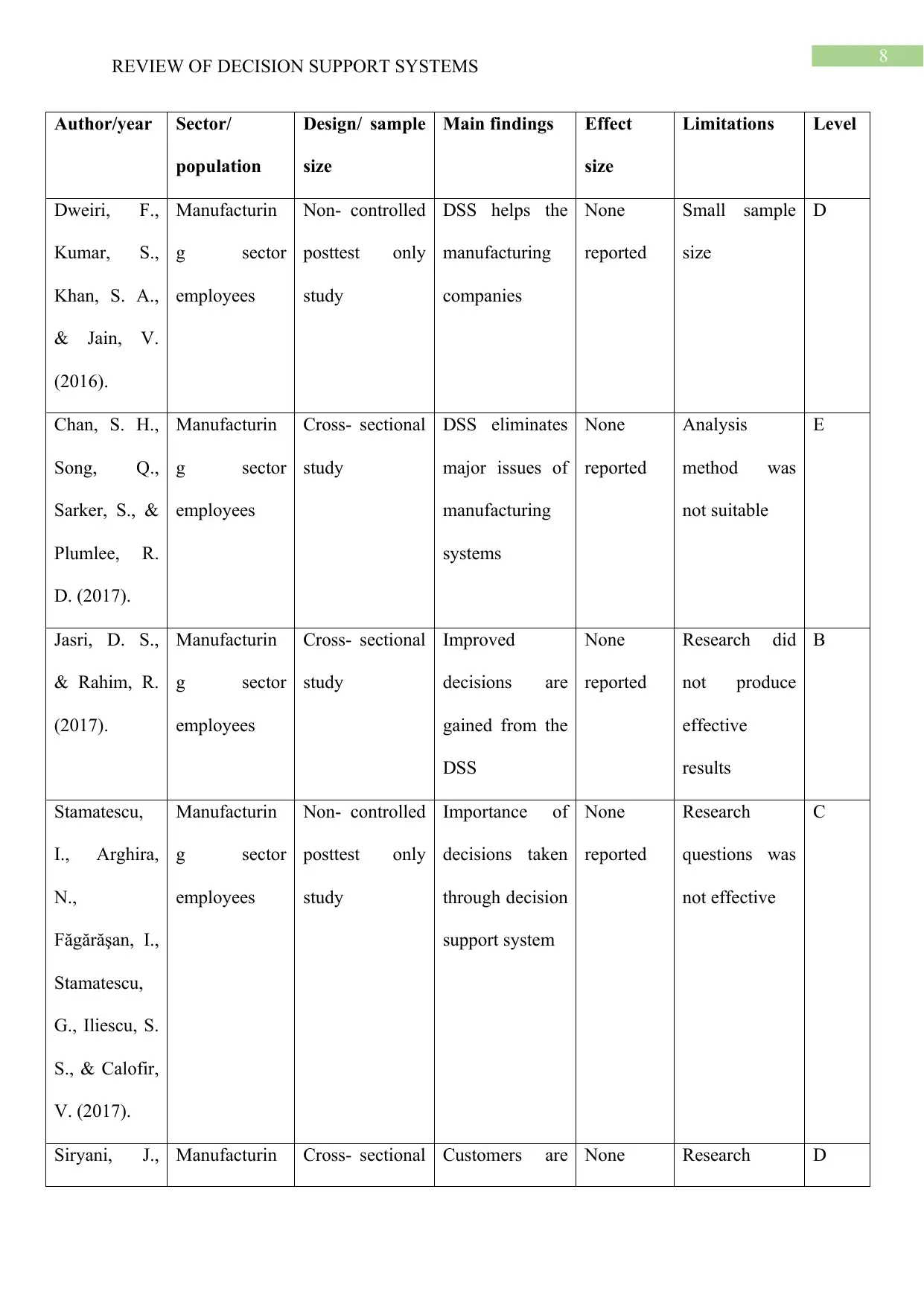
8
REVIEW OF DECISION SUPPORT SYSTEMS
Author/year Sector/
population
Design/ sample
size
Main findings Effect
size
Limitations Level
Dweiri, F.,
Kumar, S.,
Khan, S. A.,
& Jain, V.
(2016).
Manufacturin
g sector
employees
Non- controlled
posttest only
study
DSS helps the
manufacturing
companies
None
reported
Small sample
size
D
Chan, S. H.,
Song, Q.,
Sarker, S., &
Plumlee, R.
D. (2017).
Manufacturin
g sector
employees
Cross- sectional
study
DSS eliminates
major issues of
manufacturing
systems
None
reported
Analysis
method was
not suitable
E
Jasri, D. S.,
& Rahim, R.
(2017).
Manufacturin
g sector
employees
Cross- sectional
study
Improved
decisions are
gained from the
DSS
None
reported
Research did
not produce
effective
results
B
Stamatescu,
I., Arghira,
N.,
Făgărăşan, I.,
Stamatescu,
G., Iliescu, S.
S., & Calofir,
V. (2017).
Manufacturin
g sector
employees
Non- controlled
posttest only
study
Importance of
decisions taken
through decision
support system
None
reported
Research
questions was
not effective
C
Siryani, J., Manufacturin Cross- sectional Customers are None Research D
REVIEW OF DECISION SUPPORT SYSTEMS
Author/year Sector/
population
Design/ sample
size
Main findings Effect
size
Limitations Level
Dweiri, F.,
Kumar, S.,
Khan, S. A.,
& Jain, V.
(2016).
Manufacturin
g sector
employees
Non- controlled
posttest only
study
DSS helps the
manufacturing
companies
None
reported
Small sample
size
D
Chan, S. H.,
Song, Q.,
Sarker, S., &
Plumlee, R.
D. (2017).
Manufacturin
g sector
employees
Cross- sectional
study
DSS eliminates
major issues of
manufacturing
systems
None
reported
Analysis
method was
not suitable
E
Jasri, D. S.,
& Rahim, R.
(2017).
Manufacturin
g sector
employees
Cross- sectional
study
Improved
decisions are
gained from the
DSS
None
reported
Research did
not produce
effective
results
B
Stamatescu,
I., Arghira,
N.,
Făgărăşan, I.,
Stamatescu,
G., Iliescu, S.
S., & Calofir,
V. (2017).
Manufacturin
g sector
employees
Non- controlled
posttest only
study
Importance of
decisions taken
through decision
support system
None
reported
Research
questions was
not effective
C
Siryani, J., Manufacturin Cross- sectional Customers are None Research D
⊘ This is a preview!⊘
Do you want full access?
Subscribe today to unlock all pages.

Trusted by 1+ million students worldwide
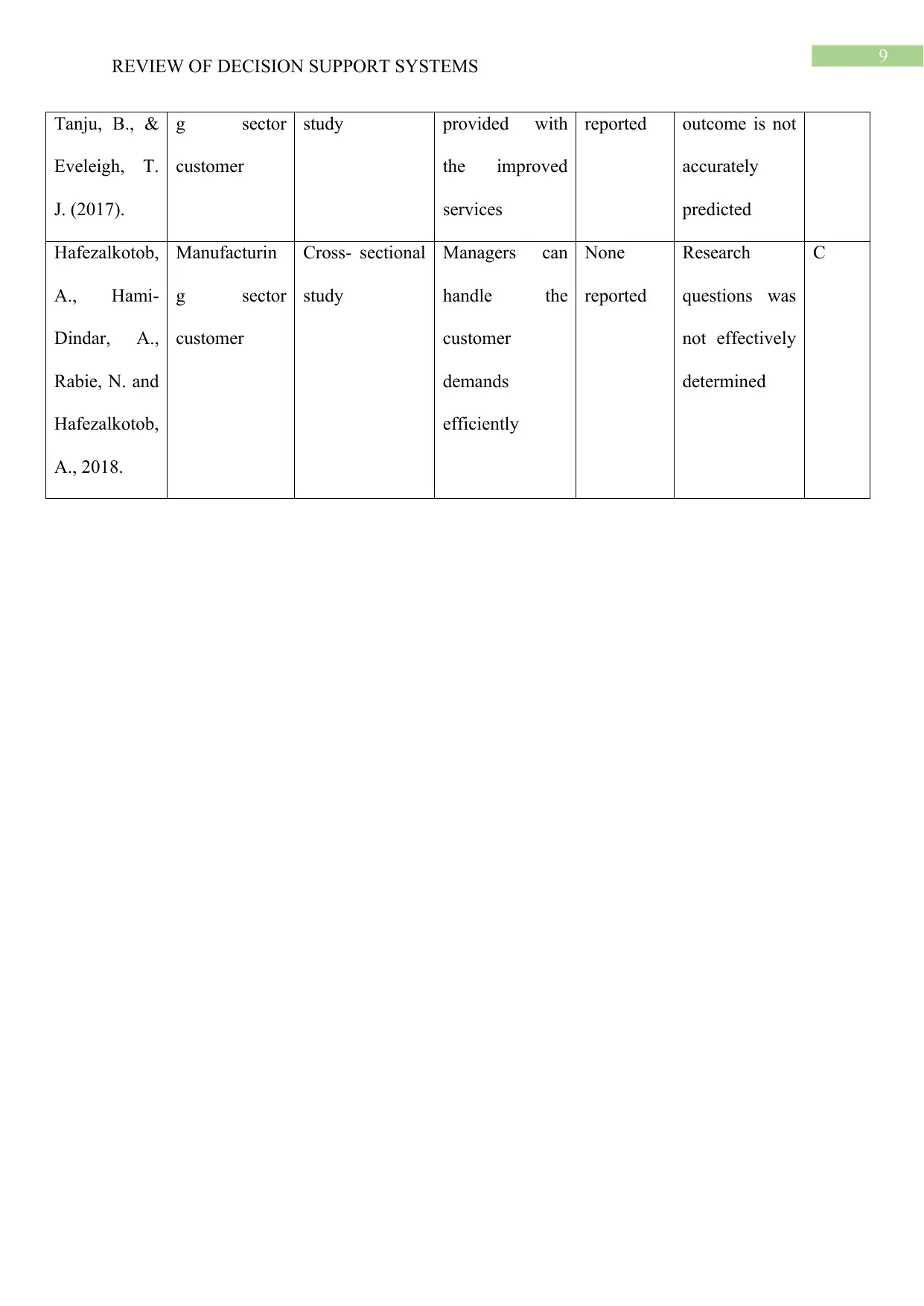
9
REVIEW OF DECISION SUPPORT SYSTEMS
Tanju, B., &
Eveleigh, T.
J. (2017).
g sector
customer
study provided with
the improved
services
reported outcome is not
accurately
predicted
Hafezalkotob,
A., Hami-
Dindar, A.,
Rabie, N. and
Hafezalkotob,
A., 2018.
Manufacturin
g sector
customer
Cross- sectional
study
Managers can
handle the
customer
demands
efficiently
None
reported
Research
questions was
not effectively
determined
C
REVIEW OF DECISION SUPPORT SYSTEMS
Tanju, B., &
Eveleigh, T.
J. (2017).
g sector
customer
study provided with
the improved
services
reported outcome is not
accurately
predicted
Hafezalkotob,
A., Hami-
Dindar, A.,
Rabie, N. and
Hafezalkotob,
A., 2018.
Manufacturin
g sector
customer
Cross- sectional
study
Managers can
handle the
customer
demands
efficiently
None
reported
Research
questions was
not effectively
determined
C
Paraphrase This Document
Need a fresh take? Get an instant paraphrase of this document with our AI Paraphraser

10
REVIEW OF DECISION SUPPORT SYSTEMS
Reference
Felsberger, Andreas & Oberegger, Bernhard & Reiner, Gerald. (2016). A Review of Decision
Support Systems for Manufacturing Systems. i-KNOW 2016.
REVIEW OF DECISION SUPPORT SYSTEMS
Reference
Felsberger, Andreas & Oberegger, Bernhard & Reiner, Gerald. (2016). A Review of Decision
Support Systems for Manufacturing Systems. i-KNOW 2016.
1 out of 11
Related Documents
Your All-in-One AI-Powered Toolkit for Academic Success.
+13062052269
info@desklib.com
Available 24*7 on WhatsApp / Email
![[object Object]](/_next/static/media/star-bottom.7253800d.svg)
Unlock your academic potential
Copyright © 2020–2026 A2Z Services. All Rights Reserved. Developed and managed by ZUCOL.




